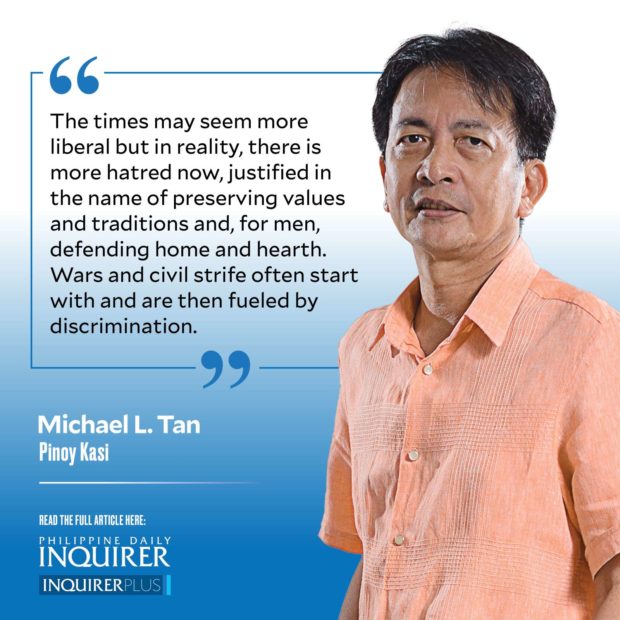I thought I’d gotten my Father’s Day column done last week, way ahead of time, with “Rizal, the father” but I felt I had to do another father-related column because of the month of June and two other commemorations besides Father’s Day.
It’s Pride Month, commemorating events of 1969 in New York, when transgenders, gay men, and lesbians, tired of police harassment, fought back and triggered massive protest actions demanding full rights, first lesbians and gay men, later to become LGBTQ or, better, LGBT+, plus, plus, plus.
There’s also Juneteenth, commemorating an executive order issued on June 19, 1865, at the end of the American Civil War, emancipating African Americans. That executive order was only the beginning of a long and still ongoing struggle among African Americans for full civil rights, erupting into the Black Lives Matter protests in 2020 following police killings of African Americans.
Only on June 19, 2021, was Juneteenth declared a federal holiday by US President Joe Biden.
Filipinos in the United States, along with other Asian-Americans, have also long been affected by racial discrimination. The violent incidents have been on the rise since the Trump administration and his anti-Chinese tirades, including blaming COVID-19 on the Chinese.
The targets for racist hate crimes tend to lump people of color together, as was the case of Vincent Chin, a Chinese-American whose 40th death anniversary will be observed this June 24. He was beaten to death in Detroit with a baseball bat by a father and his stepson who thought Chin was Japanese. The two murderers were furious with the rise of Japanese cars, which they blamed for dislocating the American car industry.
The two murderers of Chin were slapped with a $3,000 fine. They were never imprisoned.
These days, I have wondered whether I’d feel comfortable having my children study and living in the US, as I did in my youth. Larger cities, supposedly more liberal and cosmopolitan, have actually become more dangerous for people of color, as we know from the growing number of Filipino-Americans attacked in such public places as subways. We are talking not just about discrimination but about hate, targeted against people different from ourselves.
But let’s not be smug and think of it solely as an American problem. We need to look at our own backyard, at how we discriminate against fellow Filipinos who are darker, of another faith, speak with an accent and are of a different sexual orientation. Our discrimination may seem mild but can easily morph into hatred.
Fighting hate starts in homes, and I have to say fathers bear a heavier burden because fathers tend to internalize more of the prejudices of previous generations, and to express them openly, quick to curse the “Intsik” for example, or to lash out, even hitting, a “bakla” son.
My children are now coming of age, and I love hearing them say “I respect your choice” to each other, or in relation to other people who may look different and dress differently. They’re in a Jesuit school that tries hard to emphasize respect for diversity, but my children have also reported racism and homophobia, even putting down special children such as those with autism. Mild or spiteful, it is disturbing because it seems the discrimination is coming from their families, reinforced by their barkada.
Make it a point to watch “Joe Bell” on Netflix, a true story from the 1980s about a working-class father whose son comes out as gay. The father’s tough, but he tries to understand and accepts the son. Unfortunately, the son’s battles are fought in school, against bullies. Finally, the son hangs himself, aged 15. Joe Bell vows to tour America on foot, talking mainly to schools with his antibullying messages and a plea for respect for all.
The times may seem more liberal, but in reality, there is more hatred now, justified in the name of preserving values and traditions and, for men, defending home and hearth. Wars and civil strife often start with and are then fueled by discrimination.
It takes so much more time and effort to argue for diversity, but there’s much more now on the internet offering tools for education around our common humanity.
mtan@inquirer.com.ph


